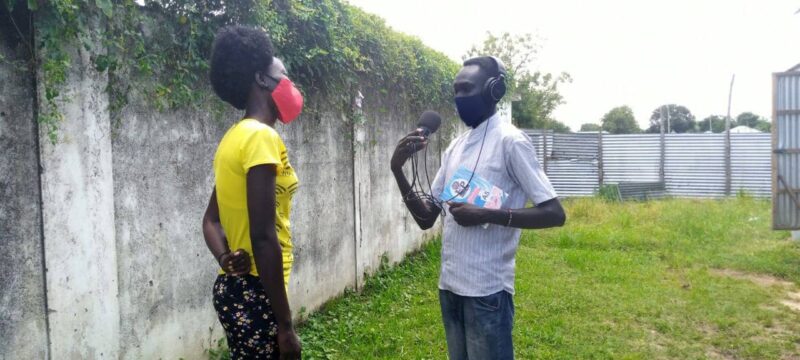Since the start of the COVID-19 pandemic, radio station manager David Manyang, at Voice of Reconciliation Radio in South Sudan, has been working relentlessly to provide the audience with facts about the virus. The station’s listeners are responding.
“I thought flood water could wash away coronavirus, but I learned [this isn’t true] and it is important not to swim in such waters or drink it directly,” said Mary, a citizen in Bor where the station is located.
As of early November, South Sudan has reported 2,926 confirmed cases and 59 deaths. These official numbers, however, are believed to underrepresent the scale of the crisis in the country, with community transmission high and testing capacity extremely low.
A journalist goes “back to school”
Although Manyang was experienced in reporting on conflict, complex politics, and natural disasters, COVID-19 presented a new challenge. “I needed the knowledge and enough understanding before [I was able to] report on the pandemic,” he said. “It was back to school for me then.”
He also had to contend with the dangers of field reporting, which became apparent early on when high-level members of the government’s COVID-19 Taskforce became sick with the infectious disease. “I had been covering press-conferences with them and it quickly came to my mind that I might have caught the virus too.” Still he pushed through his fear and started to equip his reporting bag with recorders, note-books, facemasks, and sanitizers.
To help distinguish fear from facts, Manyang attended training webinars on COVID-19 organized by Internews. He learned how to track rumors and misinformation and accessed resources such as the Lugara COVID-19 Media Bulletin and WhatsApp groups set up to support journalists to report on COVID-19.
“It helped me to respond to some of the misinformation that was going on in my community,” said Manyang.
Getting accurate information about COVID-19 to the radio audience
Manyang has been producing several hour-long radio bulletins on COVID-19 where he discusses the reopening of churches, fears of elderly citizens in Bor, and other important topics.
One listener, Makuei, reported that he thought the temperature check at the hospital might be a real COVID-19 test. “In the radio bulletin, I learned from a medical doctor that this is not COVID-19 testing. It is just a temperature check which can tell health officials whether to test more or not.”
Other listeners of Voice of Reconciliation say that Manyang’s reports have increased their knowledge on COVID-19 prevention and response mechanisms and have helped prevent them and their families from getting infected.
Voice of Reconciliation (VoR) is a community radio station in Bor that receives support from Internews in South Sudan through the organization’s USAID BHA “Information Saves Lives” COVID-19 response project.
(Banner photo: VoR journalist conducting an interview in the field following preventing COVID-19 measures of social distancing and wearing masks. Credit Internews)
